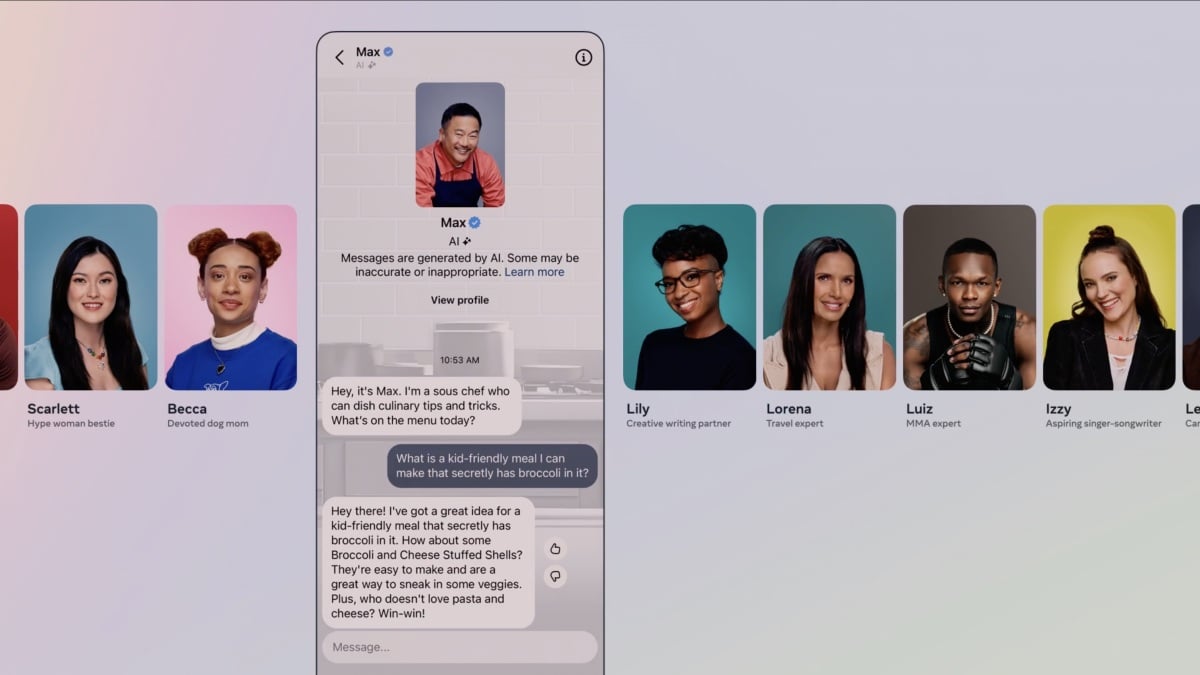
Meta’s AI characters are live, and they’re just as creepy and confusing as you might expect.
At Meta Connect 2023, CEO Mark Zuckerberg introduced a collection of various AI personas with unique interests and personalities. Through Facebook Messenger, Instagram, and WhatsApp, users can chat with specific characters about topics like cooking, workouts, travel, or general life advice. The tool is now live beta mode, giving users a chance to try it out for themselves.
It’s basically the same concept as chatbots like Replika, which lets users design and interact with their very own AI companions. Except with Meta’s version, many of the chatbots are based on actual famous people. The celebrities look and sound like themselves, but they’re not themselves, they’re playing characters.
Confused? Here are some examples: Paris Hilton plays Amber, a detective who helps you solve crimes, Kendall Jenner plays Billie, an older sister type who gives life advice, Duane Wayde is Victor, an Ironman triathlete who helps you get motivated, and Tom Brady as Bru, who likes to argue about sports. Why this baffling concept of celebrities playing someone else? Is it to prevent deepfakes? Protect from liability? If so, why use celebrities in the first place? Even so, the ol’ celebrity spokesperson gimmick doesn’t inspire much confidence.
In case you’re wondering how Meta got celebrities to sign over their likeness and throw their AI replicas at the mercy of Meta users, the answer is millions of dollars. According to The Information, the celebrities and creators were paid up to $5 million for use of their likeness, which involved up to six hours of studio time to record reactions and poses.
The most awkward conversation ever
The videos of the celebrities don’t end up playing a big part in the experience. Despite being touted as a humanizing interaction with AI, the actual experience is just texting with a chatbot. The hours of studio time were for a small window at the top of the screen which shows the characters reacting, smiling, and posing. Disappointingly, this aspect doesn’t align with your conversation. When I used the suggested prompt “I need to vent,” it coincided with video of Kendall Jenner, I mean Billie, stifling laughter and looking away uninterested. Not so supportive for a big sister.
Billie doesn’t seem super interested in letting me vent.
Credit: Meta
Aside from the emotional hurt this might cause people who really do need to vent, I expected more from Meta technologically. Why can’t one of the biggest social media companies in the world make AI personas react contextually? My hunch is that it can, but the feature is intentionally NERF-ed to prevent the use of footage for deepfakes. But that kind of negates the whole selling point of being able to interact with celebrities, since it really just seems to be an AI chatbot with pre-recorded video thrown on top.
It’s AI, acting like real people — but badly
Even if Meta did get the contextual reacting right, there’s something deeply unsettling about these personas. With ChatGPT, I know I’m talking to a bot, and it’s not trying to be anything else. Even Replikas, which humans have formed real, and sometimes inappropriate bonds with, look animated, thus creating a critical boundary between the real and artificial world. But chatting with Meta’s AI personas is like the tool is trying to convince me that the characters are human and real.
As Jules Terpak pointed out in a video on X (formerly known as Twitter), the bots are “being used as companions to reel you in.” Even when Terpak says, “bye” to MrBeast’s character “Zach,” it replies, “No way man, we’re just getting started…” in a somewhat desperate attempt to keep talking to her.
As with most social media platforms, it’s no secret that Zuckerberg’s strategy for Meta’s apps is to keep users on the platform for as long as possible — usually because it brings in more ad revenue.
Personas is a more accessible ChatGPT, just with celebrity’s faces
Creepiness aside, I could see this working for some people — especially with the characters that have specific expertise like cooking or exercising. As proven by Replika, people are willing and able to develop relationships with AI companions, and Meta’s tool has the advantage of being easily accessible to anyone with Facebook, Instagram, or WhatsApp. But I’m left with lingering questions about privacy and data. Unlike ChatGPT, there’s no ability to clear the chat history. In the settings on Instagram, there’s a grayed-out option to use end-to-end encryption, but it says “some people can’t use [it] yet.”

Max gave me recipe ideas, but wasn’t any more helpful than other chatbots.
Credit: Meta
The most helpful experience I had was with “Max,” played by celebrity chef Roy Choi. Like the other characters I chatted with, Max’s reactions had nothing to do with what I was asking about, so I mostly just ignored the window. With that out of the equation, it was a standard AI chatbot that gave me Fall soup ideas and recipes. At this point, I was just using the tool like ChatGPT, which had me wondering why not just use ChatGPT. If Meta is trying to keep users on their apps, they’re going to need more than celebrities.
Topics
Artificial Intelligence
Meta






